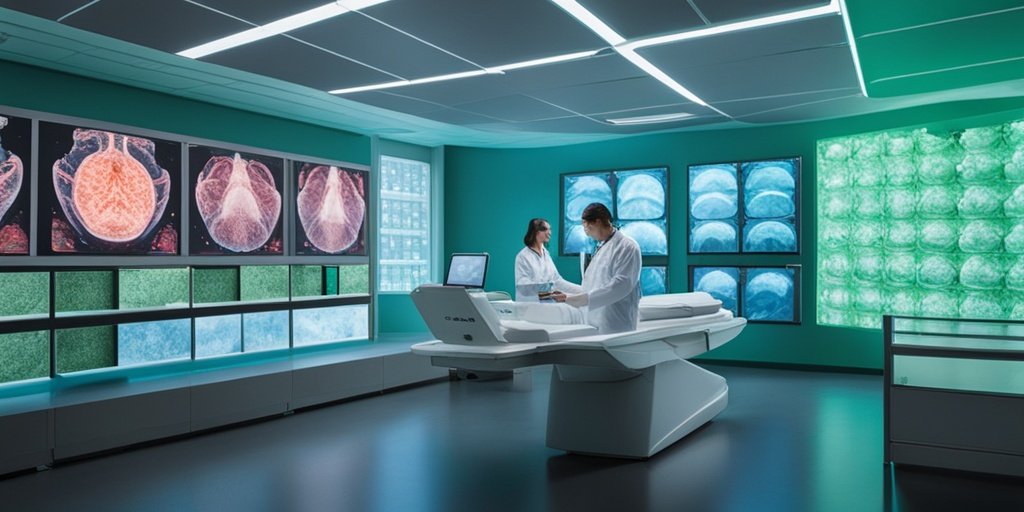⚡ Quick Summary
The article explores the innovative field of radiogenomics, which integrates artificial intelligence with imaging and genomic data to enhance non-invasive precision medicine for cancer patients. This approach promises to revolutionize cancer treatment by providing tailored therapies based on individual tumor characteristics.
🔍 Key Details
- 📊 Focus: Radiogenomics and its applications in cancer treatment
- 🧬 Technologies: High-throughput omics and advanced medical imaging
- 🤖 Role of AI: Enhancing the analysis and interpretation of imaging and genomic data
- 🌐 Applications: Across various tumor types and in tumor immune microenvironments
🔑 Key Takeaways
- 🔬 Radiogenomics combines imaging phenotypes with gene expression data.
- 💡 AI advancements are crucial for interpreting complex data sets in cancer research.
- 🌍 Multi-omics studies are enhanced by integrating radiogenomics approaches.
- 🏥 Non-invasive methods can lead to better patient outcomes and personalized treatment plans.
- ⚠️ Challenges include tumor heterogeneity and the need for clinical transformation.
- 🔮 Future trends point towards more refined applications of radiogenomics in clinical settings.

📚 Background
The demand for precision medicine in oncology has surged, leading to the exploration of novel methodologies that can provide tailored treatment options. Radiogenomics stands out as a promising approach, linking imaging data with genomic information to better understand tumor biology and patient responses to therapies.
🗒️ Study
This review article outlines the evolution of radiogenomics, detailing its foundational concepts and the technological advancements that have broadened its scope. The authors discuss the five basic workflows of radiogenomics and their applications across different tumor types, emphasizing the integration of AI in enhancing these processes.
📈 Results
The findings highlight the significant role of AI in radiogenomics, particularly in analyzing imaging data from techniques like positron emission tomography (PET). The integration of multi-omics studies has shown promise in understanding the tumor immune microenvironment, paving the way for more effective cancer therapies.
🌍 Impact and Implications
The implications of this research are profound, as radiogenomics could lead to a paradigm shift in cancer treatment. By utilizing non-invasive techniques to gather comprehensive data about tumors, healthcare providers can develop more personalized treatment plans, ultimately improving patient outcomes and quality of life.
🔮 Conclusion
The review underscores the transformative potential of radiogenomics in the realm of cancer treatment. As we continue to harness the power of artificial intelligence and advanced imaging technologies, the future of precision medicine looks promising. Ongoing research and clinical applications will be crucial in realizing the full benefits of this innovative approach.
💬 Your comments
What are your thoughts on the integration of radiogenomics and AI in cancer treatment? We invite you to share your insights and engage in a discussion! 💬 Leave your comments below or connect with us on social media:
From Images to Genes: Radiogenomics Based on Artificial Intelligence to Achieve Non-Invasive Precision Medicine in Cancer Patients.
Abstract
With the increasing demand for precision medicine in cancer patients, radiogenomics emerges as a promising frontier. Radiogenomics is originally defined as a methodology for associating gene expression information from high-throughput technologies with imaging phenotypes. However, with advancements in medical imaging, high-throughput omics technologies, and artificial intelligence, both the concept and application of radiogenomics have significantly broadened. In this review, the history of radiogenomics is enumerated, related omics technologies, the five basic workflows and their applications across tumors, the role of AI in radiogenomics, the opportunities and challenges from tumor heterogeneity, and the applications of radiogenomics in tumor immune microenvironment. The application of radiogenomics in positron emission tomography and the role of radiogenomics in multi-omics studies is also discussed. Finally, the challenges faced by clinical transformation, along with future trends in this field is discussed.
Author: [‘Guo Y’, ‘Li T’, ‘Gong B’, ‘Hu Y’, ‘Wang S’, ‘Yang L’, ‘Zheng C’]
Journal: Adv Sci (Weinh)
Citation: Guo Y, et al. From Images to Genes: Radiogenomics Based on Artificial Intelligence to Achieve Non-Invasive Precision Medicine in Cancer Patients. From Images to Genes: Radiogenomics Based on Artificial Intelligence to Achieve Non-Invasive Precision Medicine in Cancer Patients. 2024; (unknown volume):e2408069. doi: 10.1002/advs.202408069